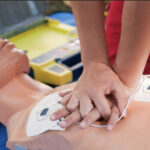A person who has stopped breathing or whose heart has stopped can be saved by performing cardiopulmonary resuscitation (CPR), which restarts the heart and breathing. The victim’s chances of life can be improved with CPR, which can help keep them alive until trained medical assistance comes. But it’s crucial to remember that conducting CPR calls for the right instruction and certification. In this post, we’ll go through the benefits of CPR certification, pediatric CPR training, online courses on bloodborne pathogens, and BLS certification online, as well as when each is necessary.
CPR Certification Benefits
Save Lives: The ability to save lives is the most evident benefit of having a CPR certification. Every second counts when someone experiences cardiac arrest or stops breathing. Knowing how to perform CPR can help you help someone who is in need right away and improve their chances of survival.
Boost Confidence: Having the information and abilities necessary to conduct CPR can give you the assurance you need to act quickly in an emergency. This can greatly influence how the scenario turns out by assisting you in remaining composed and focused.
Respect Employer Requirements: Many employers demand that their staff members get CPR certification. For individuals who labor in the fields of healthcare, education, and public safety in particular, this is true. You can meet these criteria and improve your employability by becoming CPR certified.
Enhance Personal and Professional Development: Earning your CPR certification online will help you improve both. It can help you be better at communicating, making decisions, and working under pressure. These abilities can help you progress your career and are useful in any field.
When Is CPR Certification Required?
Anyone interested in learning how to perform CPR is advised to obtain a CPR certification. However, some occupations have legal requirements for CPR certification. These consist of:
Healthcare Workers: CPR certification is mandatory for all healthcare professionals, including doctors, nurses, and emergency medical technicians. This is due to the fact that they are frequently the first to arrive at an emergency scene and may need to administer CPR in order to save a patient’s life.
Instructors: CPR certification is a requirement in several states for instructors. This is due to the fact that teachers are in charge of ensuring the health and safety of their pupils and may have to administer CPR in an emergency.
Fitness Instructors: CPR certification is frequently required of fitness instructors. This is because to the possibility that they might have to provide CPR to a customer who has a medical emergency while working out.
Benefits of Pediatric CPR Training
Learn Specialized Techniques: Pediatric CPR programs cover specific CPR methods for treating newborns and young children. This is crucial since methods that work on adults might not work on kids.
Increase Your Confidence: Being able to do CPR on children can increase your confidence and enable you to act quickly in an emergency. This can improve the child’s chances of survival while also assisting you in remaining composed and focused.
Respect Employer Requirements: Some workplaces, like schools and daycare facilities, demand that their staff members hold pediatric CPR certification. You can complete these criteria and improve your employability by being certified in pediatric CPR.
When Is Pediatric CPR Certification Required?
Anyone who works with children should obtain pediatric CPR certification, including:
Childcare professionals: It is a legal requirement for child care professionals to get pediatric CPR certification. This is because they are in charge of ensuring the security and welfare of the kids under their care.
Teachers: Pediatric CPR certification is also necessary for teachers who work with small children. This is because choking and other respiratory crises can happen to young children more easily.
Parents and carers: Attending pediatric CPR training can be helpful for parents and carers as well. In a home environment where children may be more susceptible to accidents and crises, knowing how to administer CPR to a child might be especially crucial.
Bloodborne Pathogens Online Course Benefits
Bloodborne pathogens are germs that can spread disease and are found in human blood, including viruses and bacteria. Bloodborne pathogens could be transmitted to healthcare workers, emergency personnel, and other people who come into touch with blood and other fluids. A bloodborne pathogens online course can offer crucial knowledge and instruction to help lower the danger of exposure.
Learn How to Prevent Exposure: You can learn how to prevent exposure to these bacteria by taking an online course on bloodborne pathogens. This can include handling and disposing of hazardous things properly as well as the appropriate use of personal protective equipment, such as gloves and masks.
Meet OSHA Requirements: According to the Occupational Safety and Health Administration (OSHA), employees who might be exposed to bloodborne pathogens must get training on how to avoid getting sick. You can fulfill these requirements and guarantee OSHA compliance by taking an online course.
Protect Yourself and Others: Being aware of the best ways to avoid coming into contact with bloodborne pathogens will help you and others stay safe from the transmission of infectious diseases. This is crucial in medical settings when patients’ immune systems could be weakened.
When Is a Bloodborne Pathogens Online Course Necessary?
Anyone who might come into touch with blood or other bodily fluids while at work should take a bloodborne pathogens online course, including:
Health Care Workers: Medical professionals, such as nurses, doctors, and lab technicians, run the danger of coming into contact with bloodborne diseases. They can learn how to safeguard both themselves and their patients by taking an online course.
First Responders: In an emergency situation when blood or other bodily fluids may be present, police officers, firefighters, and emergency medical technicians are frequently the first to arrive. They can learn how to defend themselves and others in these circumstances by taking an online course.
Piercers and tattoo artists: Both of these professions run the risk of coming into contact with bloodborne infections. They can learn how to safeguard their clients and avoid vulnerability by taking an online course.
Benefits of Online BLS Certification
A combination of procedures known as basic life support (BLS) is used to control a person’s airway, breathing, and circulation when they are in cardiac arrest or respiratory distress. Online BLS certification courses can give you valuable training that will enable you to react swiftly and successfully in an emergency circumstance.
Learn Essential Skills: You can learn CPR, how to operate an automated external defibrillator (AED), how to maintain an airway and breathing, and other critical skills through BLS certification online.
Learning alternatives: Online BLS certification programs provide learning alternatives that can be scheduled to accommodate your schedule. The course can be taken at your own speed and finished in the convenience of your home.
Cost-effectiveness: Online BLS certification classes have the potential to be less expensive than traditional ones. This is because they cut down on travel expenses and material costs.
When Is BLS Certification Online Required?
Anyone who might need to respond to an emergency is advised to get their BLS certification online, including:
Doctors, nurses, and emergency medical technicians are among the healthcare professionals who must be BLS certified. This is due to the fact that they are frequently the first to arrive at an emergency scene and may need to apply BLS procedures to save a patient’s life.
Police officers, firefighters, and emergency medical technicians must all have BLS certification. They may need to utilize BLS techniques to stabilize a patient before taking them to a medical facility because they are frequently the first to respond to an emergency scenario.
Non-medical professions: Although BLS certification is frequently linked to healthcare workers and emergency responders, non-medical professions can also get advantage from this instruction. Learning how to deal with a medical emergency can help teachers, coaches, and other people who work with the public.
In conclusion, vital training programs that can give people the skills they need to handle emergencies include CPR certification, pediatric CPR classes, bloodborne pathogens online courses, and BLS certification online. These programs provide adaptable possibilities for learning, economical fixes, and the capacity to satisfy legal obligations. These courses can provide you the knowledge and abilities required to save a life, whether you are a healthcare professional, a first responder, or simply want to be ready for an emergency.




